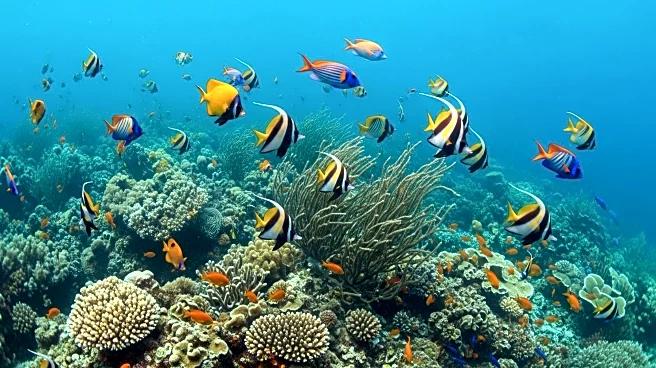What is the story about?
What's Happening?
The World Trade Organization (WTO) has implemented the first part of the Agreement on Fisheries Subsidies, aiming to curb environmentally damaging and unsustainable fishing practices. This agreement, which has been in negotiation for years, is now legally binding for two-thirds of WTO member countries. It targets subsidies that contribute to illegal, unreported, and unregulated fishing, as well as overfished stocks and unregulated high seas fisheries. The agreement is a significant step towards achieving the United Nations' Sustainable Development Goals, specifically Goal 14, which focuses on conserving and sustainably using the oceans. However, further negotiations are needed to finalize additional rules, known as Fish 2, which aim to prevent subsidies from contributing to overcapacity and overfishing.
Why It's Important?
The implementation of this agreement is crucial for the recovery of global fish populations, which have been severely depleted due to subsidy-driven overfishing. This development is particularly significant for coastal communities that rely on healthy oceans for their livelihoods and food security. The agreement also sets a precedent for future multilateral environmental treaties and encourages broader fisheries reform at regional and national levels. By limiting harmful subsidies, the WTO aims to promote sustainable fishing practices, which could lead to healthier marine ecosystems and more resilient coastal economies. However, the success of this initiative depends on effective implementation and the completion of the Fish 2 negotiations.
What's Next?
WTO members must now focus on implementing the current agreement and providing transparency regarding their subsidy programs. The Fish Fund has been established to support developing countries in monitoring and compliance efforts. The next challenge is to finalize the Fish 2 rules, which are essential for addressing the root causes of overfishing. The upcoming WTO Ministerial Conference in March 2026 could play a pivotal role in advancing these negotiations. Strong leadership from major economies and coalitions will be necessary to maintain momentum and achieve further meaningful reform in global fisheries management.
Beyond the Headlines
The agreement's implementation could have significant implications for countries like China, which is the world's largest fisheries nation. China's recent reforms in fisheries subsidies, including the abolition of fuel subsidies for non-compliant vessels, align with the WTO's objectives. However, challenges remain in ensuring that subsidies do not contribute to overcapacity and that small-scale fishers receive adequate support. The agreement also highlights the need for a global consensus on defining overfishing and determining appropriate subsidy recipients, which could lead to more equitable and sustainable fisheries management worldwide.
















